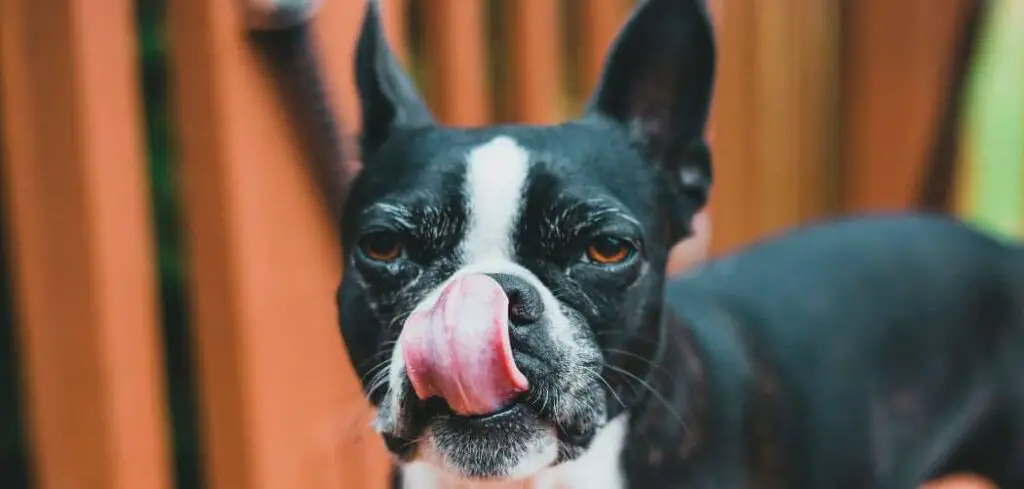If you’ve ever caught your dog smacking their lips and taken aback by their less-than-pleasant breath, you are not alone.
So, why does a dog smack their lips and have bad breath?
Let’s look at the reasons behind a dog smacking lips and bad breath and what you can do about it.
Here’s why dog smacking lips and bad breath happens
A dog smacking lips with bad breath can be caused by dental problems, nausea, oral infections or ulcers, poor oral hygiene, diet, sign of an underlying medical problem such as liver disease.

Causes of Dog Smacking Lips and Bad Breath
Dental problems
One of the main reasons a dog smacks its lips with bad breath is dental disease. Just like humans, dogs can develop dental issues such as tartar buildup, gum disease, tooth decay, or abscesses.
These conditions can cause discomfort, leading to lip-smacking behavior and a foul odor emanating from their mouth.
See Also: What does it mean when a dog’s burp smells like poop?
Nausea
Nausea can cause a dog to smack their lips, and it can also contribute to bad breath.
When dogs feel nauseous or are about to vomit, they may display behaviors such as lip-smacking, drooling, excessive swallowing, or licking their lips repeatedly.
These actions are often attempts to alleviate the discomfort or to prepare for vomiting.
When a dog vomits, the stomach acids and partially digested contents can leave an unpleasant odor in the mouth, resulting in bad breath.
Poor oral hygiene
Neglecting your dog’s oral care can contribute to smacking lips and bad breath.
Insufficient brushing, lack of regular dental cleanings, and inadequate chewing opportunities can lead to plaque and tartar accumulation, promoting bacterial growth and causing an unpleasant odor.
Diet
The food your dog eats can play a role in the smell of their breath. A dog may smack their lips and due to their diet, they may have foul breath.
Certain foods, especially those with strong odors or containing ingredients that are difficult to digest, can contribute to foul-smelling breath.
Another example is foods containing fish or other strong-smelling proteins that may leave a smell on a dog’s breath.
Also, dog foods that contain artificial additives, fillers, or low-quality ingredients may affect digestion and result in foul-smelling breath.
Oral Infections or Inflammation
Oral ulcers or infections in the mouth, including periodontal disease or oral infections like stomatitis, can result in lip-smacking and bad breath.
Inflammation and the presence of bacteria or other pathogens can contribute to these symptoms.
Underlying medical conditions
Certain systemic health conditions, such as kidney disease, liver disease, or diabetes, can manifest as bad breath in dogs.
A dog may smack their lips and due to these underlying conditions, they produce foul breath.
Related:
- Dog swallowing and licking lips? (Explained)
- Is your dog still leaking after glands are expressed: Here’s why
What to do when a dog smacks lips with bad breath
Book a veterinary check-up
If you notice persistent lip smacking and bad breath in your dog, consult your veterinarian.
They will examine your dog’s mouth, teeth, and overall health to determine the underlying cause of the lip-smacking and bad breath.
Maintain oral hygiene
Regular dental care is important for preventing dental problems and combating bad breath and oral infections that lead to smacking of the lips and bad breath.
Brush your dog’s teeth regularly with a dog-specific toothbrush and toothpaste to help remove plaque and bacteria.
Provide your dog with dental chews and toys
Dental chews and toys designed for dogs can help promote oral hygiene by reducing tartar and plaque buildup.
They can also help in freshening your dog’s breath. Look for products specifically labeled as beneficial for dental health.
Choose high-quality dog food
Opt for reputable dog food brands that prioritize high-quality ingredients and incorporate dental care benefits. Look for products that are specifically formulated to promote oral health.
A change in diet may be necessary to improve your dog’s breath. Your vet can recommend a suitable diet or specific dental care formulas that aid in oral health.
Also, avoid feeding your dog table scraps. Human food, especially certain types, can contribute to bad breath in dogs. Refrain from giving your dog table scraps or foods that are known to cause bad breath.
Provide fresh drinking water
Ensure that your dog always has access to clean and fresh water. This helps prevent dehydration and promotes saliva production, which aids in maintaining oral health.
